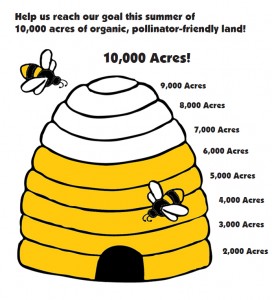16
Aug
On National Honey Bee Day, Ask Retailers to Stop Selling Bee-Killing Products
(Beyond Pesticides, August 16, 2013) Beyond Pesticides just helped release a new report with Friends of the Earth and other allies, revealing that the world’s most popular pesticide, neonicotinoids, implicated as a key factor in global bee die-offs, may be lurking in our own gardens. As we celebrate National Honey Bee Day this weekend, join in asking Lowe’s, Home Depot and other leading garden centers to take action and stop the sale of neonicotinoids and plants treated with these bee-killing chemicals.
 There are now dozens of insecticides on retail shelves that contain neonicotinoids. Product labels show the active ingredients of these products, including: imidacloprid, acetamiprid, clothianidin, dinotefuran, nithiazine, thiacloprid and thiamethoxam. While neonicotinoids is a relatively new class of insecticide that affects the central nervous system of insects, a growing body of science has demonstrated neonicotinoids (neonics) are a key factor in bee decline nationwide, with beekeepers recording losses of up to 90 percent of their bees this winter. Recently, 50,000 bumblebees, likely representing over 300 colonies, were found dead or dying in a shopping mall parking lot in Wilsonville, Oregon. Authorities confirmed that this massive bee die-off was indeed caused by the use of a neonicotinoid pesticide, dinotefuran, on nearby trees. Similarly, 37 million honeybees were reported dead across a single farm in Ontario from the dust associated with planting neonicotinoid-treated corn seeds. Exposure to these chemicals also poses long-term risks to bees and can affect bee reproduction, foraging, navigation and memory, and also impairs their immune systems making them more susceptible to parasites and pathogens.
There are now dozens of insecticides on retail shelves that contain neonicotinoids. Product labels show the active ingredients of these products, including: imidacloprid, acetamiprid, clothianidin, dinotefuran, nithiazine, thiacloprid and thiamethoxam. While neonicotinoids is a relatively new class of insecticide that affects the central nervous system of insects, a growing body of science has demonstrated neonicotinoids (neonics) are a key factor in bee decline nationwide, with beekeepers recording losses of up to 90 percent of their bees this winter. Recently, 50,000 bumblebees, likely representing over 300 colonies, were found dead or dying in a shopping mall parking lot in Wilsonville, Oregon. Authorities confirmed that this massive bee die-off was indeed caused by the use of a neonicotinoid pesticide, dinotefuran, on nearby trees. Similarly, 37 million honeybees were reported dead across a single farm in Ontario from the dust associated with planting neonicotinoid-treated corn seeds. Exposure to these chemicals also poses long-term risks to bees and can affect bee reproduction, foraging, navigation and memory, and also impairs their immune systems making them more susceptible to parasites and pathogens.
A recent study by researchers at USDA finds that honey bees exposed to neonicotinoids are more susceptible to the deadly gut parasite, Nosema ceranae, contributing further to declines in bee populations. Neonicotinoids have also been found to be toxic to grassland birds who eat neonicotinoid treated seed. A recent review by David Goulson, PhD, finds overall that broad ranging negative impacts occur from neoniconinoid use, not only on beneficial pollinators, but on overall biodiversity and ecosystem health.
The European Union (EU) is set to suspend the use of three neonicotinoid pesticides later this year, after a scientific review by European Food Safety Authority found that neonicotinoids pose an unacceptably high risk to bees. In the U.S. these chemicals are subject to a lawsuit in Federal District Court over the U.S. Environmental Protection Agency (EPA) failure to protect pollinators.
In addition to asking Lowe’s and Home Depot to stop the sale of of these products, we urge you to download and customize this sample letter and take it in to your local retailer customer service manager. Please tell us when you do (include store name, city and state), so we can follow-up!
Sample Letter:
Dear Sir/Madam:
I am writing to [insert company name] to commit to not sell neonicotinoid pesticides, as well as plants and seeds treated with these pesticides. A growing body of science shows that these pesticides are a key factor in global bee die-offs. Neonicotinoids, such as imidacloprid, clothianidin, thiamethoxam, dinotefuran, and acetamiprid, are highly toxic to bees and other beneficial organisms including birds and aquatic organisms. These chemicals contaminate the entire plant, including nectar and pollen, throughout the life of the plant, and also persist in soil and contaminate surface water. Recently, 50,000 bumble bees died in Oregon as a result of neonicotinoid application on trees. Beekeepers have lost as high as 90 percent of their hives this year alone. As a result of this, garden supply retailers should stop the sale of neonicotinoid pesticides to protect honey bees and other pollinators, essential for one in three bites of food in the U.S. and 20-30 billion dollars in our agricultural economy.
The European Union has already banned neonics and a majority of the UK’s largest home improvement retailers, including Homebase, B&Q and Wickes, have made public commitments to no longer sell products containing pesticides linked to declining bee populations. We call on to your company to join these leaders in sustainability and pollinator health by making this same commitment here in the U.S. to remove neonicotinoids from your shelves.
As a loyal customer, my family, friends, and I would appreciate your company taking a stand to protect honey bee health by discontinuing the sale of neonicotinoid-containing products at your store.
I look forward to hearing back from you and the opportunity to provide you with additional information. In the meantime, you can learn more about the effects of Neonicotinoids at www.BEEprotective.com.
Thank you for your urgent attention to this matter.
Sincerely,
____________________
Other Ways to BEE Protective for National Honey Bee Day
Through the BEE Protective campaign, Beyond Pesticides is leading a national public education effort supporting local action aimed at protecting honey bees and other pollinators from pesticides and contaminated efforts. Bees are in trouble and policy makers are just not acting quickly enough to help them, it’s your turn to join us in taking action to protect these beneficial insects.
- Tell your member of Congress to support the Save American’s Pollinators Act introduced last month by U.S. Representatives Earl Blumenauer (D, Ore.) and John Conyers (D, Mich.) to suspend the use of neonics on bee-attractive plants until EPA reviews all of the available data, including field studies. The bill, which Beyond Pesticides helped draft, aims to provide long overdue protections for America’s imperiled pollinators.
 Take the pollinator protection pledge to devote your own yard, garden, park, and backyard as a Pesticide-Free Zone that you can manage as organic pollinator habitat. We already have 6,529.74 acres pledged as organically managed and pollinator friendly, help us reach our goal of 10,000 acres this summer!
Take the pollinator protection pledge to devote your own yard, garden, park, and backyard as a Pesticide-Free Zone that you can manage as organic pollinator habitat. We already have 6,529.74 acres pledged as organically managed and pollinator friendly, help us reach our goal of 10,000 acres this summer!- Encourage your local schools, government agencies, religious institutions and businesses to use their buying power to go neonic-free. Urge your municipality, institution or company to adopt the model resolution which makes the commitment to protect pollinators from harmful pesticide applications and create pesticide-free refuges for these beneficial organisms.
- Plant your own colorful, bee-friendly garden using our BEE Protective Habitat Guide.
- Tell your friends and family about the dangers of neonicotinoids to honey bees and pollinators and tell them how they can Manage Landscapes with Pollinators in Mind.
- BEE the Change T-Shirts. HoneyColony will donate 15% of the proceeds from their “Bee the change” T-shirts to Beyond Pesticides! Just be sure to type in “beyondpesticides” in the coupon code!
- Join us on Facebook and/or our email list to get updates on the grassroots campaign.
Let’s BEE Protective and support a shift away from the use of these toxic chemicals by encouraging organic methods and sustainable land management practices in your home, community, or on you campus.
All unattributed positions and opinions in this piece are those of Beyond Pesticides.











We want to protect bees.
August 17th, 2013 at 9:11 pmWe protect bees on our organic farm
August 17th, 2013 at 9:12 pmWithout bees, there will be no food.
August 18th, 2013 at 1:28 amStop selling be killing products. NO BEES NO LIFE!!!
August 19th, 2013 at 2:36 pm